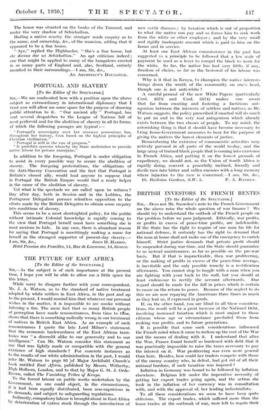THE FUTURE OF EAST AFRICA
[To the Editor of the SPECTATOR.] Sia,—As the subject is of such importance at the present time, 1 hope you will be able to allow me a little space for this letter.
While sorry to disagree further with your correspondent, Mr. J. A. Watson, as to the standard of native treatment adopted by white settlers in East Africa, in the past and up to the present, I would remind him that whatever our personal wishes in the matter, it is impossible to see smoke without inferring a fire. The mere fact that so many British people of perception have made remonstrances, from time to tune, shows that there is something radically wrong in our treatment of natives in British East Africa. As an example of such remonstrances I quote the late Lord Milner's statement that the economic backwardness of the East African terri- tories was "a discredit alike to our generosity and to our intelligence." Can Mr. Watson consider this statement as one that was lightly made or compatible with the general existence of high standards ? For concrete instances as to the results of our white administration in the past, I would refer Mr. Watson to page 93 of Major Archibald Church's book entitled East Africa, published by Messrs. Witherby, High Holborn, London, and to that by Major G. St. J. Orde- Brown, called The Vanishin,g Tribes of Kenya.
To the forced labour on public works undertaken by the Government, no one could object, in the circumstances, if it had been equally distributed, been non-capricious in Its demands, and subject to safeguarding regulations. Indirectly, eompulsorylabour is brought about iii East Africa by deterioration of r•ative stock through the introduction of
new cattle diseases ; by taxation which is out of proportion to what the native can pay and so forces him to seek work from the white or other employer ; and by the very small and rigidly inadequate amount which is paid to him on the farms and in service.
At least one East African commissioner in the past has suggested as a principle to be followed that a low scale of payment he used as a lever to compel the black to work for the white. So far, the native has had very little, if any, freedom of choice, so far as the bestowal of his labour was concerned.
Why is it that in Kenya, to champion the native interests brings down the wrath of the community on one's head, though one is not anti-white ?
A careful perusal of the new White Papers (particularly Cmd. 3578 and Cmd. 3574) makes one aware that far from creating and fostering a factitious ant- agonism between the interests of settlers and natives, as Mr. Watson suggests, the policy prescribed if enacted will do much to put an end to the very real antagonism which already exists between the two classes of people. To my mind, the astonishing thing is that it should have become necessary to bring home-Government measures to bear for the purpose of giving the natives the barest elements of justice.
Remembering the existence of communistic activities very actively pursued in all parts of the world to-day, and the large army of trained black people that is coming into existence in French Africa, and putting it on the lowest grounds of expediency, we should not, as the Union of South Africa is rapidly doing, convert a peacefully inclined, friendly and docile race into bitter and sullen enemies with a long memory where injustice to the race is concerned.—! am, Sir, ho.,
10, Barks/on Gardens, S.W. 5. P. A. 13ANxEs.




















































 Previous page
Previous page